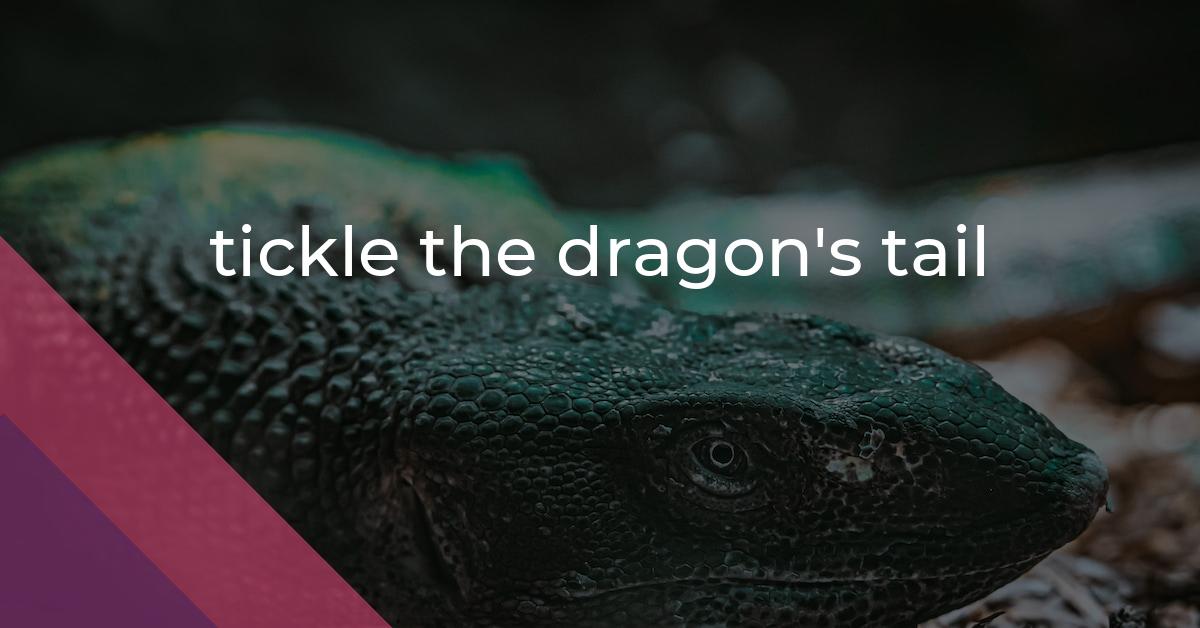tickle the dragon’s tail: Idiom Meaning and Origin
What does ‘tickle the dragon's tail’ mean?
The idiom *tickle the dragon's tail* means to engage in a dangerous or risky activity, often provoking or challenging someone or something powerful and potentially causing serious consequences.

Idiom Explorer
The idiom "tread on someone's toes" means to offend or irritate someone by encroaching on their territory, interfering with their affairs, or acting in a way that they perceive as a violation. It implies crossing boundaries and causing resentment in the process.
The idiom "touch a nerve" means to say or do something that upsets or angers someone, usually because it reminds them of a sensitive or painful subject.
The idiom "tickle someone's pickle" is a colloquial expression meaning to excite or please someone, often in a sexual context.
The idiom "tickle someone's funny bone" means to amuse or make someone laugh.
The idiom "tickle pink" means to be extremely pleased or delighted about something.
The idiom "tempt fate" means to take unnecessary risks or challenge the possibility of something bad happening.
The idiom "take the bait" means to fall for a trick or deception, often by reacting exactly as the trickster desires, thus becoming trapped or manipulated.
The idiom "take a risk" means to undertake an action or make a decision that involves uncertainty or potential danger, often in pursuit of a desired outcome. It implies a willingness to face potential negative consequences and to step outside of one's comfort zone.
The idiom "tail wagging the dog" means a small or unimportant thing or person controlling a larger or more powerful thing or person. It refers to the idea of a dog being controlled by its tail, instead of the tail being controlled by the dog.
The idiom "stick one's neck out" means to take a risk or put oneself in a vulnerable position by expressing an opinion or taking action that goes against the norm or common consensus.
Furious Consequences
The idiom "tickle the dragon's tail" is used to describe a risky or dangerous action. It involves provoking or challenging a powerful or unpredictable entity. This expression finds its roots in ancient mythology and folklore, symbolizing the potential consequences and perils associated with confronting a monumental force.
Dragons, widely found in many cultures and legends throughout history, are often depicted as immensely powerful and fearsome creatures. Their tails are typically portrayed as an integral part of their strength and ferocity. Touching or "tickling" a dragon's tail, therefore, can be seen as a metaphorical act of defiance or tempting fate. By alluding to the dragon's tail specifically, this idiom emphasizes the inherent risks and potential consequences of engaging with powerful forces that may be beyond one's control.
The figurative use of "tickle the dragon's tail" has expanded over time to encompass a wider range of contexts. Nowadays, the idiom is often employed in discussions related to politics, economics, or any situation where individuals or entities are perceived to be daring enough to challenge or provoke potentially dangerous or unstable situations. It conveys a sense of audacity, recklessness, or even bravado in the face of potential harm or unintended consequences.
While the exact origins and early usage of this idiom remain somewhat elusive, it has permeated through collective consciousness and found its way into the vernacular. It has gained traction as a vivid and evocative way of describing a risky endeavor. Its longevity and continued usage demonstrate the enduring appeal and relevance of this idiom across cultures and generations.
As with many idioms, the precise meaning and connotation of "tickle the dragon's tail" can vary depending on the context and the individual employing it. Its figurative nature leaves room for interpretation, allowing speakers to add subtle nuances or emphasize different aspects of risk or defiance. This flexibility contributes to its enduring popularity, capturing the imagination and piquing curiosity.
The idiom "chase the dragon" is closely related to "tickle the dragon's tail". Both idioms involve engaging with a powerful force, but "chase the dragon" typically refers to the pursuit of an elusive and addictive high, often associated with drug use. The phrase "chase the dragon" originated from a Chinese method of smoking opium where the smoke was inhaled through a pipe shaped like a dragon's tail. Like "tickle the dragon's tail", "chase the dragon" conveys the risks and potential consequences of pursuing something powerful and potentially harmful.
Another related idiom is "tickle someone's funny bone". This phrase refers to something that is amusing or funny, often causing laughter. It suggests that humor has the power to provoke a joyful or pleasurable reaction, similar to tickling a physical sensation. While "tickle the dragon's tail" conveys risk and danger, "tickle someone's funny bone" highlights the ability of humor to elicit a positive and lighthearted response.
"tickle someone's pickle" is yet another related idiom. This colloquial expression is often used in a humorous or cheeky manner to refer to sexually provocative or stimulating actions or comments. While the origin of this idiom is unclear, it shares the theme of tickling as a metaphorical act that evokes a particular reaction or sensation. In contrast to the metaphor of danger in "tickle the dragon's tail", "tickle someone's pickle" explores the realm of humor and innuendo.
The idiom "feed the dragon" offers another connection to "tickle the dragon's tail". While "tickle the dragon's tail" emphasizes the risks of engaging with a powerful entity, "feed the dragon" conveys the idea of providing sustenance or support to this powerful force. It suggests a precarious balance between appeasing and potentially exacerbating a dangerous situation or individual. Both idioms underscore the unpredictable nature of dealing with powerful forces.
The final idiom related to "tickle the dragon's tail" is "have a tiger by the tail". This expression conveys the idea of being engaged in a difficult or dangerous situation where control is tenuous at best. Similar to "tickle the dragon's tail", "have a tiger by the tail" emphasizes the risks and potential consequences of confronting a powerful and unpredictable force. Both idioms highlight the precarious nature of engaging with forces that may be beyond one's control.
Example usage
Examples:
- She decided to tickle the dragon's tail by challenging the company's decision, even though it could have serious consequences for her career.
- The politician's provocative statement to the media was seen as an attempt to tickle the dragon's tail and stir up controversy.
- By investing heavily in a risky venture, the entrepreneur was knowingly tickling the dragon's tail in the hopes of making a huge profit.
More "Danger" idioms



